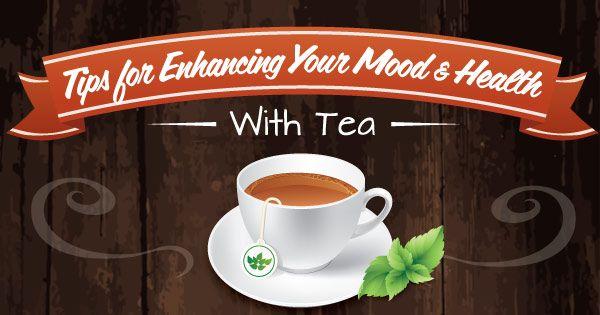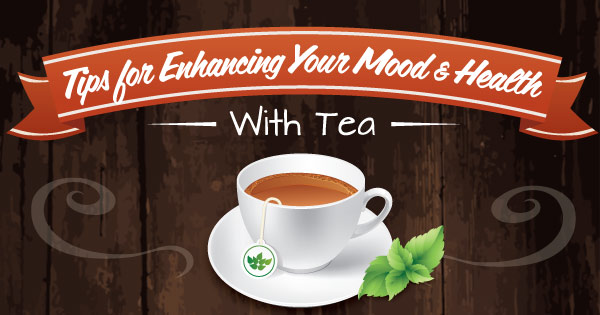I love tea. I wrote all about tea in my last post, covering the flavor profiles, origins, caffeine content as well as some tips on how to brew the perfect cup. Now it’s time to dig a little deeper.
While some people drink tea to enjoy the flavor, many consume this beverage for the benefits to mood and health.
Below are some of the key benefits of drinking tea. Hopefully this chart will help you choose the right type of tea.
The Perfect Tea for Every Mood

Tea to Wake Up and Energize
Today’s market is full of products that are designed to help us wake up in the morning, but only so many of them help you obtain a natural and healthy boost. Instead of looking to the massive energy drink full of sugar, give green, black or yerba mate tea a try.
Green tea offers 25-35 mg of caffeine to help give a light boost of energy. More specifically, matcha green tea is even more beneficial because it contains L-theanine, which offers natural relaxation so you can feel energized without feeling jittery like you might with coffee.
Want more caffeine? Black tea contains 40-60 mg of caffeine, which will give you an even bigger boost in the morning. Earl Grey and breakfast teas are two popular blends that black tea lovers go to for help enhancing energy levels.
Yerba mate is another suitable source for waking up due to its high levels of antioxidants, vitamins and minerals. The combination of theobromine and caffeine also give the right boost without unwanted jitters.
Tea to Fall Asleep with Ease
To counter the energy boost early in the day, various teas help with sleep when it’s time to wind down. When I need to get some sleep, I look to chamomile, lavender or valerian tea.
Chamomile has been around for centuries and is the most popular tea for helping with sleep. It helps calm your mood and settle your thoughts so you can relax and fall into a blissful sleep. It also has a delicious flavor. Think of it as your bedtime snack.
Lavender offers a tranquil scent, so why shouldn’t it also offer tranquility for the entire body? Lavender tea gives you a calm and uplifting sense of well-being, which results in feeling relaxed and ready for rest. Valerian tea will also help achieve this state of well-being with a sweet and slightly bitter aroma and flavor.
Tea to Support Immune Health
Maintaining a healthy immune system in today’s environment is essential to good health. Some of the most popular teas for boosting immune health are green, tulsi, echinacea and elderflower. All of these teas deliver an abundance of antioxidants (including polyphenols) that are designed to support several systems in your body, primarily the immune system. A healthy dose of antioxidants from tea will help you maintain your health and wellbeing. Try these teas with citrus for an added vitamin C boost.
Tea to Manage Nerves and Stress
With so many people on the go with work, family and personal obligations, managing nerves and stress is essential to living a happy and healthy life. Fortunately, there’s a tea for that, or rather several teas.
For managing nerves, try valerian, ashwaganda or passionflower tea. I previously mentioned valerian for sleep, and it’s just as beneficial when calming the nerves. If you want something that will not change your energy level, brew a cup of ashwaganda tea. This herbal tea can be taken in the morning for a no-nerves-allowed day. Passionflower helps boost the brain’s level of the neurotransmitter GABA, which causes your brain activity to calm down so you don’t focus on everything that’s making you nervous.
To de-stress, give one of these many beneficial teas a try: lavender, valerian, ashwaganda, passionflower, ginseng, lemon balm or peppermint. Ginseng tea helps manage exhaustion associated with stress, leaving you feeling peaceful and calm. Lemon balm consists of terpenes that cause a relaxing effect. It’s a nice triple effect formula for stress, nerves and sleep. As for peppermint, its menthol makes it beneficial in combating mental stress.
Tea to Support Cognition & Mental Performance
You need your brain in working order before you can even think about getting anything else done. More specifically, cognition and mental performance are essential to good health, especially as we age. The two main supporters of brain health are green and black tea.
Green tea is made up polyphenols that help support brain cells to regulate learning and memory. Black tea has L-theanine, which helps increase alpha-brain waves. It also supports attention to help you concentrate better on mental and physical tasks. I suppose that explains why I gravitate to green and black tea whenever I am reading or writing. Just think of all the things these teas could help you focus on!
Tea to Enhance Emotional Wellness
Another important area of brain health is emotional wellness. We’ve all woken up on the wrong side of the bed before, and now you can do something about it instead of thinking about that less-than-happy feeling. Two herbal tea favorites for emotional wellness are saffron and turmeric.
Saffron influences the neurotransmitter serotonin in the brain, which gives off a good-feeling signal, resulting in a happier state. It has also been shown to be beneficial for mood swings associated with PMS.
Like saffron, turmeric tea also has an influence on serotonin in the brain, but also on dopamine, giving it a double-punch of good feelings. This tasty golden spice is sure to make you feel golden inside.
Bonus: Along with being good for cognition, green tea also helps with emotional wellness. The polyphenols help release dopamine to give off a feeling of happiness in the brain.
Tea to Calm Your Digestive Environment
From metabolism to stomach comfort, tea has you covered. Our digestive systems require a lot of attention these days, so let a cup of delicious tea help keep everything in check.
For maintaining a healthy metabolism, try green or peppermint tea. Green tea contains EGCG (Epigallocatechin gallate), which is beneficial in speeding up metabolism and burning additional calories. Peppermint tea helps stimulate bile, which promotes healthy bowel movements and digestion. You can also go crazy and try them together. It’s quite delicious, I promise.
Need overall stomach comfort? You have options. Fennel, ginger, rooibos and peppermint are all good options. Fennel consists of volatile oil compounds that help ease mild and occasional nausea, bloating, cramps and flatulence. Ginger is best known for reducing mild and occasional nausea as well as motion sickness when traveling. Rooibos contains high levels of the flavonoid quercetin that helps with mild and occasional cramps, diarrhea and indigestion. Peppermint is a carminative, which helps gas move through the body naturally instead of causing minor stomach discomfort, bloating or cramping.
Tea to Combat Mild and Occasional Constipation
While most people don’t like talking about it, regular bowel movements are just as important as healthy digestion. Dealing with mild and occasional constipation involves many different possible options, but a natural approach is always best. Senna and peppermint teas are two solid options for maintaining a regular bowel movement.
Tea to Detoxify Naturally
There’s a lot of talk about detoxing, and there are a lot of formulas for it. We once again turn to herbal teas to find a healthy, natural approach. Dandelion has been used in Chinese and Native American remedies as a liver detoxifier. Nettle tea delivers beneficial detox properties to the body to help cleanse the urinary system, giving your body a fresh start.
Tea to Boost Antioxidant Levels
Getting enough antioxidants is important for all areas of health. Luckily, many tea varieties are packed with antioxidants, giving you a delicious drink while boosting your health. Black, green and oolong teas all come from the plant Camellia sinensis, which are rich in polyphenols, a form of antioxidant. Black and green teas also contain flavonoids, another type of antioxidant. Rooibos and white teas also contain antioxidants. In short, if you want a tea with antioxidants, they aren’t hard to find. My personal favorite is a green antioxidant.
No matter what area of health you are looking to maintain, tea is a delicious and natural option. Whether you need tea for mood or various health benefits, there’s always a cup of tea waiting to assist. If you are not yet a fan of drinking tea, consider various tea additions to enhance the flavor while enjoying the benefits.




